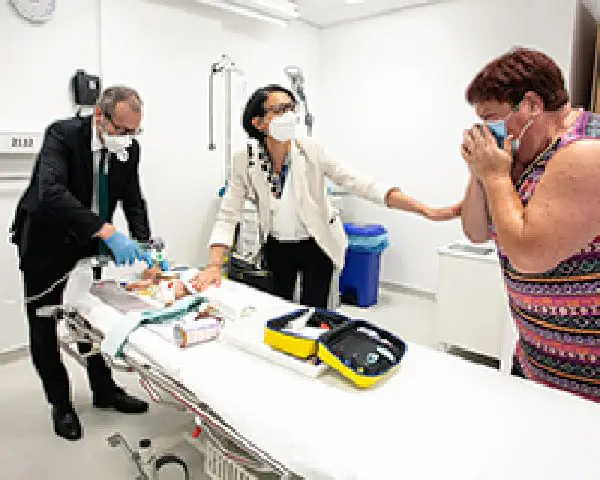Slovenia showcases strength of primary health care during visit from WHO Regional Director for Europe.
Employing 1637 staff, the Community Health Centre (CHC) Ljubljana, located in the Slovenian capital, provides comprehensive care to over 422 000 residents. This includes preventive health care, treatment of chronic diseases, and response to emergency situations such as natural disasters and, more recently, the COVID-19 pandemic.
While at CHC Ljubljana during a country visit to Slovenia, WHO Regional Director for Europe Dr Hans Henri P. Kluge remarked on the wide range of care it offers to patients. He spoke with staff about CHC Ljubljana’s role as a cornerstone of health security in the country and as a leader in innovative digital health solutions. Digital health is a flagship area of the European Programme of Work 2020–2025 (EPW) – “United Action for Better Health in Europe”.
Health at the centre of communities
“We do the screening of all the population over the age of 30 for risk factors for noncommunicable chronic diseases such as cardiovascular disease, diabetes, chronic obstructive pulmonary disease and depression,” explained Dr Tea Stegne Ignjatovič, Medical Director at CHC Ljubljana. “We plan these screenings in every practice of family medicine.”
But screening for diseases is just one part of CHC Ljubljana’s work. The Centre has capacity to treat ongoing or chronic illnesses, provide mental health support, and conduct research and development. It also provides care to marginalized communities.
The Government of Slovenia has been investing in strengthening primary health care for many years. The Regional Director praised the people-centred approach of this model, which ensures that well equipped health centres are people’s first point of contact with the health system, providing comprehensive health care for communities.
Adapting to emergencies
Since the outbreak of the COVID-19 pandemic, CHC Ljubljana has provided emergency care, including mass vaccination and testing. It was able to adapt to the situation with a dual-track system, enabling it to care for both COVID-19 and non-COVID-19 patients to help manage the burden of cases.
To improve the response to other health emergencies, such as natural disasters and accidents, CHC Ljubljana also developed a protocol which is now mandatory in other community health centres to strengthen the Slovenian system overall.
Centre of excellence
“The most important thing is education for professionals and the population to develop a new approach to prevention and patient treatment, and to introduce a new methodology,” explained Dr Antonija Poplas Susič, Deputy Director for the Development of Health Services at CHC Ljubljana.
“We provide training for the professionals who are involved in these protocols on how to deal with these situations,” added Mr Rudi Dolšak, General Manager at CHC Ljubljana.
This focus on education, research and working with partners has made Slovenia’s approach a source of learning for countries implementing changes in their own health systems. Slovenia’s expertise is being further honed with the creation of the Simulation Centre (SIM Centre) at CHC Ljubljana to ensure that health workers are trained to deal with a range of scenarios.
Dr Kluge was given a tour of the SIM Centre, which provides advanced simulations with state-of-the-art equipment. The first of its kind at the primary care level, it teaches over 3000 participants a year how to respond to emergencies such as cardiac arrest, serious burns and major accidents.
Primary health care is an important part of achieving universal health coverage. Ensuring more people benefit from universal health coverage is a key part of WHO’s 13th General Programme of Work (GPW 13) and the EPW.







